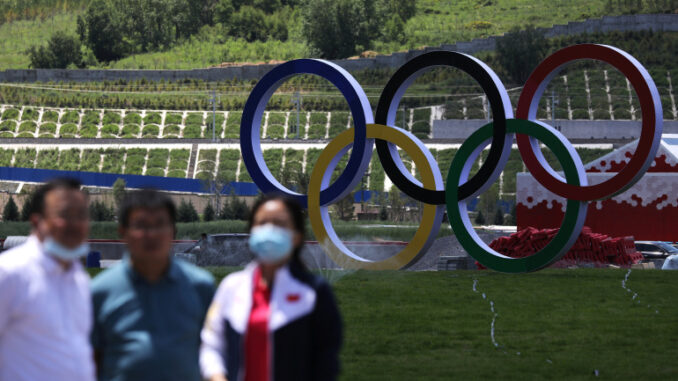
TOKYO — Two athletes residing in the Olympic Village tested positive for the coronavirus, officials said Sunday, the first instances of athlete infections inside the Village, underscoring growing fears about the spread of the virus during the Games that are set to begin in five days.
That means three people have tested positive inside the Village, an area of Tokyo that is closed off to the public where Games personnel reside, dine and get tested. On Saturday, officials confirmed the first positive case inside the Village of an individual who was not an athlete. All three people came from the same country, are participating in the same sport and have been isolated in individual rooms, officials said Sunday. The rest of their teammates have also been tested and isolated individually, they said.
Also on Sunday, the South African Football Association announced that three members of its soccer delegation for the Olympics tested positive for the coronavirus. The infected were two players and a video analyst, according to Reuters.
Thousands of athletes and other accredited personnel are entering Japan ahead of the Games, which is set to begin Friday amid a state of emergency due to rising coronavirus cases in the country’s capital. Japan has barred all spectators from Olympic events in and around Tokyo in an effort to curb the spread of the virus, but public support for the Games remains lukewarm.
So far, 55 people affiliated with the Games have tested positive for the coronavirus since the committee began tracking infections earlier this month.
Sign up for our Tokyo Olympics newsletter to get a daily viewing guide and highlights from the Games
Officials said Sunday they are working to minimize risk as quickly as possible when an individual tests positive, isolating the person and anyone else who had come in close contact. Those who test positive or come in close contact must train separately, be transported individually and have meals delivered to their individual rooms. After a certain number of tests and amount of time appropriate for each case, the individual can return to compete.
Olympic officials said they are creating a “covid safe” environment to ensure positive cases would not spread throughout the Games, and noted that the opportunity for the residents of the Village and the general Japanese public to interact is “incredibly limited.”
“It is unavoidable that we have some cases — we have some cases. What is needed is some swift actions,” Christophe Dubi, Olympic Games executive director for the International Olympic Committee, said in a news conference Sunday. “I don’t think we can ever say ‘covid free’ — I don’t think we said it. Covid safe is a different approach. … It’s a covid-safe environment, and they are really insistent on this.”
More than 18,000 athletes, officials and journalists have arrived in Japan since July 1 for the controversial Games, which was postponed a year due to the global pandemic. Officials said between 6,000 and 9,000 athletes and related personnel will reside in the Village at any given point during the Games.
A troubled sequel: Tokyo’s bid to remake classic 1964 Olympics set to disappoint
Those arriving from overseas are tested for the coronavirus before taking off and after landing in Tokyo. International Olympic Committee President Thomas Bach, who has been the subject of repeated criticism over the controversial pandemic Games, this week promised that there is “zero” risk that the virus would spread through the Olympic Village or beyond, citing the fact that everyone who arrives in Japan is tested for it.
Bach on Saturday drew a fresh round of ire amid reports that the Tokyo Olympic organizing committee had plans to host a welcome party for Bach on Sunday evening with 40 guests, including high-profile politicians.
Critics responded online to reports of the welcome event by noting that the state of emergency urges members of the Japanese public not to gather in large numbers.
Among those invited are Japanese Prime Minister Yoshihide Suga, Tokyo Olympic organizing committee president Seiko Hashimoto and former Olympics chief Yoshiro Mori, who resigned earlier this year over sexist remarks he made about women, according to a report Saturday by NHK.
When asked about the welcome event during a news conference Saturday, Bach noted he was invited as a guest, rather than an organizer, of the gathering.
Meanwhile, local officials in Osaka said a Ugandan athlete who had gone missing from a training camp there left a note that he intended to stay in Japan because of difficulties living back home, according to local media. The Ugandan athlete did not show up to a coronavirus test on Friday and had been reported missing. Local officials said they found the note in his place of accommodation.

Be the first to comment